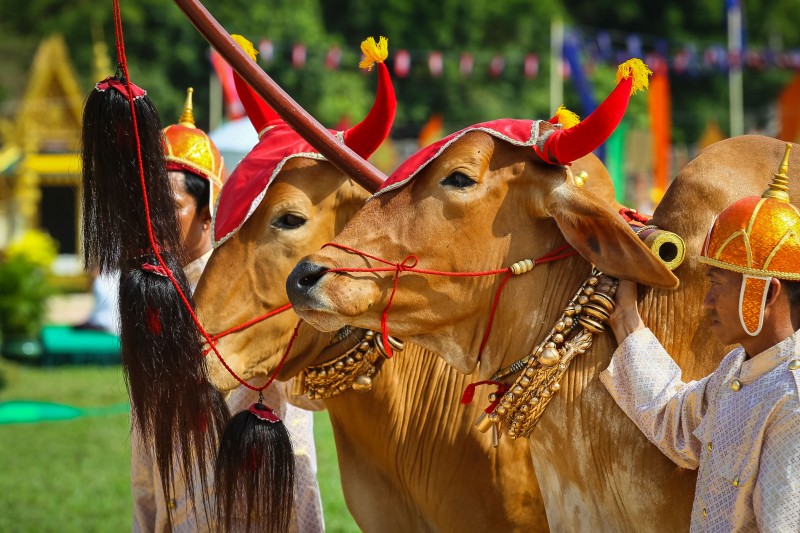The country may still be feeling the effects of the worst drought in recent memory, but farmers of rice, beans and corn can be assured of a bountiful harvest in the coming year, according to Royal Palace astrologer and Brahmin priest Kong Keng.
“Rice will have a better yields by 90 percent,” Mr. Keng proclaimed on Tuesday. “Corn will also have better yields by 90 percent, and beans will have better yields by 95 percent.”

The declaration came at the close of Tuesday’s annual Royal Plowing Ceremony, which saw two royal oxen offered up a range of food and drink options that, when tasted, reveal the agronomic fate of the country.
King Norodom Sihamoni presided over the ceremony while hundreds gathered among the ruins of Angkor Thom complex’s Terrace of the Elephants in Siem Reap province, watching patiently as the oxen made their culinary choices.
After three symbolic rounds of plowing, the oxen were relieved of their red harnesses and offered rice, sesame seeds, corn, fresh-cut grass, beans, water and rice wine.
That the stately beasts devoured the rice, beans and corn meant healthy yields could be expected for each, Mr. Keng said.
“This is the prediction based on the tradition of the Royal Plowing Ceremony, which has existed since ancient times,” he said.
It was a drastic departure from previous years, when the oxen shunned the rice, the priest said in a later interview.
“For the last three years the royal oxen mostly ate beans and corn, so it is strange that the royal oxen ate a lot of rice. The rice yield will be good.”
The ceremony, which is held to announce the arrival of the rainy season, has an obscure past. Son Soubert, an ethnologist with an expertise on Cambodian customs, said the practice had existed in the country for more than 100 years.

“We don’t know from which period it has been performed in Cambodia, but at least it’s from…the 19th century,” he said.
The popular spectacle was stopped under the Khmer Rouge regime and did not return until 1994, though a lack of royal involvement made for an inauspicious comeback, Mr. Soubert said.
“That year was catastrophic,” he said, recalling an annum filled with social, political and meteorological turbulence. “That was not a very good year because the king did not preside over [the ceremony].”
Pi Proeun, a 54-year-old farmer from Siem Reap’s Svay Chek district, said he had no doubts about the veracity of the fortunes foretold by the oxen.
“I have heard older people say from one to another that whatever the prediction is, the result will be the same,” he said. “I really believed in it because the results always turn out the same as the prediction.”
However, not everyone was convinced by the bovines’ breakfast.
Kong Pon, 47, who watched the ceremony live on television from Kompong Speu province, said he enjoyed the pageantry but placed little stock in the oxen’s tastebuds.
“Based on what I have observed previously, the result is sometimes right and sometimes wrong,” he said. “The prediction was that this year would have good rain, but there turned out to be a shortage.”
Hean Vanhorn, deputy director of the Agriculture Ministry’s agriculture department, who expected a tough year for rice farmers, said the ceremony could have a positive impact on their work ethic.
“It’s a traditional prediction, and one that can encourage the farmer to participate in rice production,” he said.
On the other hand, he added, “If something goes wrong in the prediction…maybe farmers will go to find another job.”




